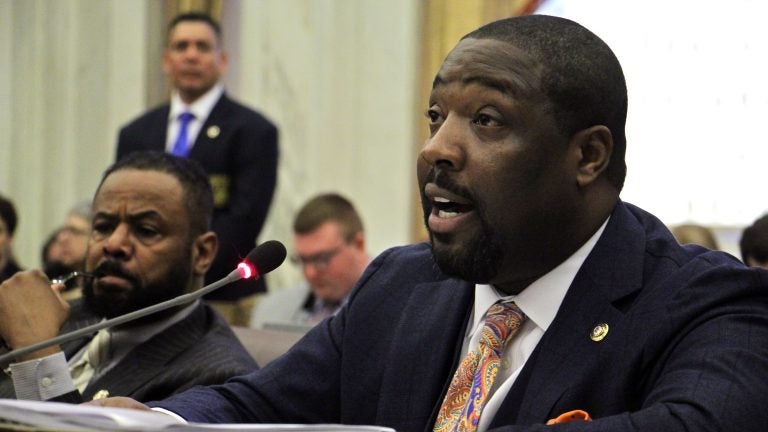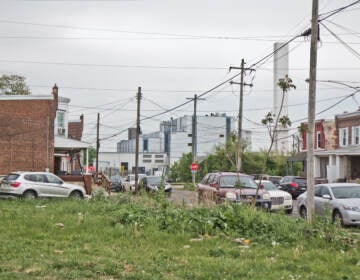City Councilmen respond to land-flip scandal with an offer of reform
City Councilman Kenyatta Johnson and Council President Darrell Clarke introduced a bill Thursday they say creates new safeguards against corrupt land dealing in City Hall.

Philadelphia City Councilman Kenyatta Johnson. (Emma Lee/WHYY)
This article originally appeared on PlanPhilly.
—
City Councilman Kenyatta Johnson and Council President Darrell Clarke introduced a bill on Thursday that they say creates new safeguards against corrupt land dealing in City Hall.
Introduced on the tail of a Philadelphia Inquirer investigation into a sale of city-owned property that profited a childhood friend of Johnson, the bill expands and clarifies the responsibilities of the Vacant Property Review Committee.
It’s an obscure body chaired by an appointee of the City Council President, but one with outsize importance. The advisory body must recommend a public land sale before the transaction can be voted on by City Council and other land holding agencies. And it will not initiate the process without a letter of support from a district Councilperson.
Johnson took center stage in the Inquirer investigation and subsequent calls for accountability because the lots that went to his friend, the developer Felton Heyman, were in his district and went to the developer for below-market value. Heyman told city officials he would build affordable housing on the vacant properties but instead sold them with a sizeable markup to a market-rate developer.
The Point Breeze sales moved forward after Johnson sent a letter of support to the property review committee.
Staffed by a mix of City Council and mayoral appointees, the 14-person committee has come under scrutiny by critics who argue that it lacks transparency and contributes to the city’s pay-to-play political culture.
“Although the review committee is staffed by administration officials it is controlled by council,” Pew Charitable Trusts wrote in a 2015 report. “Its operations follow no written bylaws or guidelines, officials say, and its work gets little public attention.”
The new legislation, introduced by Johnson on behalf of Clarke, would make a number of small changes to the review committee. The most meaningful tweak seems to be new language requiring that the body inspect properties 18 months after a developer recommended by the board has acquired the title of a property. The inspection is meant to ensure that projects advanced by the board are redeveloped in accordance with the approved proposal.
Clarke’s bill would also require that all properties moved into the Redevelopment Authority or the Land Bank’s holdings receive a fair market value appraisal that has been reviewed by the VPRC. The board would also be required to draft written policies for its property disposition process. The Law Department is tasked with enforcing all these provisions.
Johnson blames the sales to Hayman on a breakdown of communication between agencies.
“There are several steps that take place before Councilmembers introduce a piece of legislation, and that process is clearly flawed and broken,” said Johnson on Thursday following the hearing.
But while Johnson and Clarke argued on Thursday that the new regulations will increase the accountability of the VPRC, affordable housing advocates and other said that the bill does not do enough to address city’s flawed pay-to-play culture.
“City Council prerogative must be reined in,” said Thomas Earle, a founding member of the Philadelphia Coalition of Affordable Communities and CEO of Liberty Resources, Inc., a federally funded non-profit that provides housing for the disabled. “Council members through their prerogative are circumventing the equitable development requirements of the Land Bank by keeping desirable vacant city properties out of the Land Bank and instead using the VPRC to distribute vacant city properties in a non-transparent manner as recently exposed in Point Breeze.”
Affordable housing developers and market-rate developers said that the bill made some needed reforms. But nearly all said that most important action needed is divorcing City Council from its power over individual land sales. The new bill does not do that.
“The real problem is that all Land Bank properties have to go to the VPRC,” said David Feldman, a spokesman for the Development Workshop, a real estate trade group. “That is the step that should be amended. All fair-market value properties that have multiple bidders should be allowed to be sold by the Land Bank without VPRC or Council sign-off.”
The vacant property committee’s history is not well documented. But according to Mark Schwartz, the executive director of Regional Housing Legal Services, it is an institution that emerged as a means to rebalance power between the mayor and the council after the urban renewal era.
“In my view, the VPRC is a response to what went on in the city in the 1960s and 1970s, when the Redevelopment Authority and the Mayor controlled every single thing and left Council out,” said Schwartz. “The whole idea was to spread power around so the Redevelopment Authority couldn’t take lots of property and displace people [like it did during urban renewal].”
Schwartz says the bill makes sense to him in light of the city’s persistent land use controversies. He said he hopes the legislation is refined as the legislative process unfolds.
Johnson also introduced a resolution calling for hearings on the VPRC’s role in land sales. A coalition of affordable housing groups released a letter on Tuesday demanding that the City Controller investigate City Council’s involvement in land sales. Johnson acknowledged that call on the Council floor and said he embraced it. The Inquirer also reported that the Federal Bureau of Investigations is looking into the matter.
“I also support the call for an audit by the controller of the process as a whole for the city of Philadelphia,” said Johnson. “Obviously, the second councilmanic district will be a part of that process. Let’s look at that system overall, in general.”
WHYY is your source for fact-based, in-depth journalism and information. As a nonprofit organization, we rely on financial support from readers like you. Please give today.







